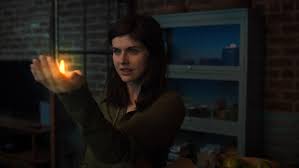**There will be spoilers for the show and the books.**
And the show and the books take their huge split here. It was inevitable, given that The Witching Hour is a thousand page book and still ends on a cliffhanger where Lasher’s endgame is just then revealed. Again, how many authors could get away with that?
Lasher continues to seduce Rowan by exploring her own powers with her. While I feel this correctly reflects the Rowan in the books, it also reminds me why I disliked Rowan in the books. This brilliant, strong, modern, capable woman, is still easy to enchant, confuse, and seduce through her curiosity and prone to hysterical and dramatic reactions to things–like blindly following a bunch of witches she doesn’t know to use a magic she doesn’t understand to transfer Lasher to Tessa (who didn’t exist) to free herself rather than having to *checks note* continue to fight the supernatural the way she seemed able to fight sexism for her entire life in the first episodes.
But hey, at least we got to finally see the bone dolls–er, doll. This creepy relic made from the bones and hair of the previous witches was an ominous, often described thing in the book, which never really was shown to do anything. Except maybe be creepy.
Rowan seeming to feel regret over giving up the link to Lasher was irritating. For a brilliant neurosurgeon she seems incapable of making an actual decision. True as written.
While it was also nice to see Suzanne’s story play out (though again, not as written, possibly trying to making Suzanne out to be far more relatable) it was very disappointing that it happened through Ciprien reading the necklace. Aaron spent his whole life researching and reassembling the Mayfair files, and that seems cheapened by not showing the dedication and care in Ciprien. Both Aaron and Michael had the positive traits of being dedicated and patient, neither of which seems to be transferred to Ciprien by the show writers. They both took the role of father figures and protectors to Rowan (and others, like Beatrice). Yes, which raised some awkwardness when it came to Roawn and Michael’s relationships. But certainly they were two of the only truly good characters in the books, in part because of this. Earlier in the season they set Cip up as a protector, but by changing this they made him a clueless and impotent one.
 In their efforts to delete the issues of the Talamasca being problematic stalkers under the claims of being scholars, they’ve also deleted the impact from the books of Rowan thanking them for assembling the family history and restoring what had been lost during Carlotta’s reign to the family. The deft slight of hand Rice performed in this book, to build a family so powerful, then have a single character strip it all away piece by piece, only to have some of the power restored through knowledge *just in time for the true reasoning of the villain to be revealed* was such a jerk to the hopes and fears of the readers that this solidified her place in the horror genre more than writing about witches and vampires did. The show made a major miss with this.
In their efforts to delete the issues of the Talamasca being problematic stalkers under the claims of being scholars, they’ve also deleted the impact from the books of Rowan thanking them for assembling the family history and restoring what had been lost during Carlotta’s reign to the family. The deft slight of hand Rice performed in this book, to build a family so powerful, then have a single character strip it all away piece by piece, only to have some of the power restored through knowledge *just in time for the true reasoning of the villain to be revealed* was such a jerk to the hopes and fears of the readers that this solidified her place in the horror genre more than writing about witches and vampires did. The show made a major miss with this.
And while I suppose it was necessary on some level to add a more complex, modern, and on going tension (and let’s face it, it is very easy to tie a tale of powerful women to modern day oppression and fears) this episode threatens to veer the whole show away from the story Rice told and into some new, much more familiar and common quest to Save the Established Characters From the Big Bad. How disappointing.
Is Tessa supposed to be Mona? Or just a foil to Rowan? Neither. I suspect she’s just going to be the Baby Jenks of this story, an instrument to build tension and an artificial sense of
Will she witch or won’t she”. I groanfully suspect she’s there just to convince Rowan to accept her power, and to die tragically to inspire Rowan to be stronger. Oh, writers, are you going to Fridge her?
My final disappointment, that I’ve already touched on, is Suzanne’s whole story. I feel the writers have stripped it of its uniqueness by making it yet another uninspired story of an innocent woman turned evil by evil men. certainly there are lots of those stories out there, and were in our history at that time. Rice didn’t shy from it with her treatment of Suzanne and Deborah as merely characters in the tragic tale of Petyr Van Abel. But little things, like Suzanne just playing around with magic she didn’t understand, thus starting the whole tale, and Deborah, a smart and powerful as she was, being presented as only an obsession and tragedy in Petyr’s life was like subtexual commentary on how history–even this formulated history of how powerful women embraced their power–is often chance, and often only valid when observed by, or recorded by a man. Will enhancing Suzanne’s story end up stripping Deborah’s? Very likely, I fear.